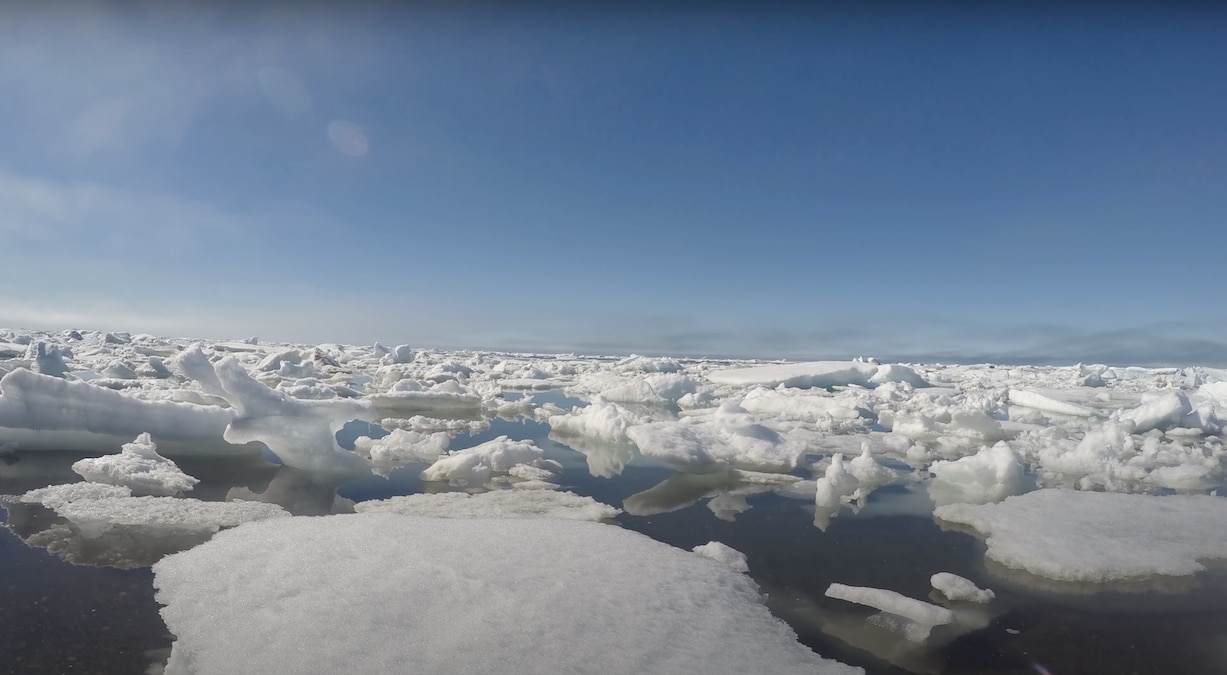Arctic Sea Ice Maximum Extent Is Fifth Lowest on Record

 Why you can trust us
Why you can trust us
Founded in 2005 as an Ohio-based environmental newspaper, EcoWatch is a digital platform dedicated to publishing quality, science-based content on environmental issues, causes, and solutions.
The Arctic sea ice extent for the Northern Hemisphere winter of 2023 is the fifth lowest on record.
The National Snow and Ice Data Center (NSIDC) announced Wednesday that the Arctic sea ice likely reached its maximum extent on March 6 at 5.64 million square miles. That’s 398,000 square miles below the average maximum for 1981 to 2010, which was 6.04 million square miles.
“These effects are clearly linked to human-caused climate change and have major implications regionally across the Arctic,” Dr. Zack Labe, a postdoctoral researcher who works at the NOAA Geophysical Fluid Dynamics Laboratory and the Atmospheric and Oceanic Sciences Program at Princeton University, told Carbon Brief of the figures.
The climate crisis contributes to the loss of Arctic sea ice through warmer ocean and atmospheric temperatures, as the U.S. Environmental Protection Agency (EPA) explained. The sea ice typically melts in the summer and reaches its minimum extent in September, then rebuilds over the winter to cover most of the Arctic Ocean by March. However, the Arctic is also warming nearly four times faster than the global average, so both the September minimum extent and the March maximum extent of sea ice have been decreasing over the last four decades.
The lowest minimum extent was in September 2012, at 44 percent below the 1981 to 2010 average, while the lowest maximum extent was in 2017, at 7.4 percent less than the 1981 to 2010 average. All of the five lowest maximums on record were measured in the past eight years, and all of the 10 lowest maximums in the past 17, according to the NSIDC. This year’s March 6 maximum extent was also six days earlier than the 1981 to 2010 average of March 12. All of NSIDC’s comparisons are based on a 45-year satellite record.
The data was released the same day as a new study published in Nature, which found that Arctic sea ice changed significantly after 2007 to become thinner and younger, ushering in a new “regime” in the region.
“Our analysis demonstrates the long-lasting impact of climate change on Arctic sea ice through reduced residence time, suggesting an irreversible response of Arctic sea ice thickness connected to an increase of ocean heat content in areas of ice formation,” the study authors wrote.
This regime change came partly because, after massive summer ice loss in 2005 and 2007, the ability of the now-darkened ocean to reflect sunlight — otherwise known as the albedo effect — decreased, leading to more warming.
Arctic ice loss is therefore significant because it triggers a feedback loop, leading to more warming in the region, the EPA explained. Moreover, a loss of ice harms Arctic ecosystems and Indigenous communities because the large mammals like polar bears and walruses that relied on the ice for breeding and hunting now struggle to access it. This in turn threatens the lifestyles of subsistence hunters like the Yup’ik, Iñupiat, and Inuit Indigenous groups, who also depend on the ice and the wildlife it supports.
This year, there were alarming signals not only from the Arctic, but from the Antarctic as well, which saw its record lowest minimum sea ice extent on Feb. 21 at 1.79 million square kilometers (approximately 700,000 square miles) as Carbon Brief reported. This broke a record set only the year before.
“[F]or several months this year, global sea ice extent – Arctic plus Antarctic – has been at a record low,” NSIDC Director Dr. Mark Serreze told Carbon Brief.
Subscribe to get exclusive updates in our daily newsletter!
By signing up, you agree to the Terms of Use and Privacy Policy & to receive electronic communications from EcoWatch Media Group, which may include marketing promotions, advertisements and sponsored content.

 233k
233k  41k
41k  Subscribe
Subscribe 




